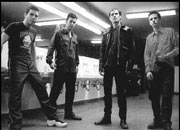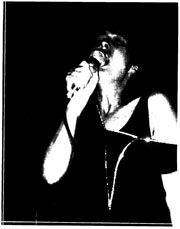GIRLS AGAINST BOYS
RADIO 4, MINUS THE BEAR
Crocodile Cafe, 441-5611, $10 adv.
9 p.m. Fri., Sept. 13
NOBODY TIRES OF being the prodigal son—not even rock ‘n’ rollers. The new millennium has been rife, in fact, with punk prodigals returning to indie waters after years of swimming in the mainstream: Bad Religion, Mudhoney, Butthole Surfers, Rocket From the Crypt, Henry Rollins. And, of course, Girls Against Boys, New York’s arty, quasi-hardcore iconoclasts.
Raised in the small confines of Touch & Go, GVSB left the indie in the late ’90s to bask in the bright lights of major label Geffen. But when the company was subsumed by Universal in the biggest music merger in history, the band found themselves in limbo—not dropped but not actively supported either. Their last disc for Geffen, the electronic foray Freak*on*ica, came out four years ago.
This year, freed from their corporate shackles, the prodigals came home. Not to Touch & Go, but to Jade Tree, the Delaware emo imprint that’s released albums by the Promise Ring and Pedro the Lion. Fittingly, Girls Against Boys’ new disc, You Can’t Fight What You Can’t See, is a return to form to their thoughtful, hip-shaking, hard rock.
That’s the short version of the story, the one that accepts the majors as Goliaths and indies as Davids. Take it as you like, but GVSB singer and guitarist Scott McCloud is just glad to be back at work.
“We’ve been stuck in a chaotic state for a long time,” he says by mobile phone from Manhattan.
“While good things can come out of chaos, it’s also chaos. . . . I would go in the practice space every day and wonder what I’m doing it for. You wonder, is this band going to make any records again? Am I going to make any more records? Of course you want to. Having a question mark like that, it’s really unpleasant in a way. For us, I think it’s a testament to our bond as a band that we kind of pulled through and made a record at all.”
At the same time, the band’s disorder hasn’t settled completely. It’s been a while since GVSB has played for live audiences. They have to, as Patti Smith once said at the start of a tour, “shake the dust onto their shoes,” to find their common groove again.
“It’s hard to know even how we’re operating at the moment,” McCloud says. “Things to me seem kind of more—what’s the word for it? I think we’re at a crux. . . . We haven’t done a record in so long, and we’re doing one now. We’re getting out there on the road, which we haven’t done in a while.”
Though You Can’t Fight What You Can’t See merges new songs with cuts penned in the band’s limbo years, it feels quite cohesive, more controlled than chaotic. Curtains of noise from McCloud and keyboardist/guitarist Eli Janney scuff up the melodies, evoking the sound of a radio not quite tuned right. Johnny Temple’s bass anchors the dark atmosphere, while Alexis Fleisig’s drum work conveys just the right amount of caffeinated hypersensitivity.
The new disc is, in a sense, an extension of the work began in Soulside, the under-acclaimed, pre-GVSB band McCloud, Temple, and Fleisig ran in late ’80s Washington, D.C. Like GVSB, the band plied an abstract, punchy noise. (Soulside’s music is out for reconsideration next month, when Dischord Records issues its 20 Years of Dischord box set.)
One of the new disc’s highlights, “Tweaker,” is inspired by forever fruitless bar talk about making dreams reality, but it sounds instead like a song about bands shooting for the brass ring on Billboard‘s Top 200. “You can drown with everyone/With a sound for everyone,” McCloud sings in a bridge that might not be out of place on The End. “Yeah,” he says, “to dumb yourself down or to fit in, it’s a soul-crushing experience.”
“All the Rage” owns up to the band selling itself short on the search for mass acceptance: “Nobody gave you no warning anyway/That the world was so boring anyway/And now it’s ripping your heart out.”
“You’re flirting with this kind of conformity, so in a weird way, you don’t believe enough in your own personal vision,” McCloud says. “That’s the real spark of life. It’s a shame to try to conform to this boring world that’s supposed to be so great and rewarding. Really what’s rewarding is pursuing your own vision.”
Spoken like a true prodigal punk, home at last.








